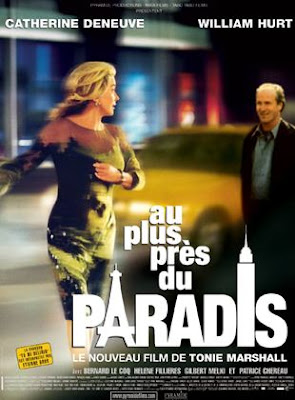
L'Esquive is called Games of Love and Chance in English, an avoidance of the real name: 'L'Esquive' here is best translated as 'Avoidance', which is really what the film is about. Certainly we can argue that the mise en abyme, the play within the film – Marivaux's Le jeu de l'amour et du hasard, of which the English name is a literal translation – is also principally about a kind of avoidance, but we'll come to that later.
L'Esquive is set in several working-class HLM areas of 93 (Seine-Saint-Denis), a département high in immigration, social problems, etc. But unlike, say, La Haine or Deephan, Abdellatif Kechiche doesn't concentrate on violence or gang culture, but on the ordinary lives and loves of a group of adolescent students. There is a notable scene of realistic violence with a hand-held camera in which the police search the cooperative kids, but that is all: certainly there's a great deal of verbal violence, but that in part acts as an illustration not only of the frustrations of adolescence but of the use of the language of the kids. They speak FCC, or 'Français contemporain des cités'.
FCC is a variety of French which changes frequently to stay in fashion with itself, and is noted for its use of verlan or backslang, itself a word in verlan (l'envers, or even, perhaps, langue verte (meaning 'slang')): louche becomes chelou, mec keum, flic keuf, etc: there are hundreds of such examples of verlan, all in fact a kind of avoidance of conventional French. Even esquiver itself is 'verlanised' to vesqui. FCC goes much further than this though, such as the altering of word forms: là in regular French changes from an adverb of place ('there') to an adverb of time ('now'), the adjective grave ('serious') becomes an adverb ('extremely'), and can even be a gesture of agreement, and so on. Words from other countries can reflect multiculturalism, such as the Arabic kiffe ('love'), zaama ('so-called'), inchallah (lit. 'God willing'), wallah ('I really mean it'); or Anglicisms such as 'kiss', 'lol', 'cool', 'fun', or 'Miss'.
Returning to Marivaux's play, written nearly 300 years ago, this is being put on by the class as an end-of-term activity. Naturally, the language comes over as strained, rhetorical and unnecessarily polite, but there are of course universals at work here, and the playing of love games is the most obvious one. Sylvia's father intends her to marry Dorante, the son of a friend of his, and because she's alarmed by the prospect of marrying someone she's never seen, she has her father agree to her changing roles with her servant Lisette in order to observe Dorante from a distance: a kind of avoidance tactic, as it were. However, unbeknown to Sylvia and Lisette, Dorante has had the same avoidance idea and swaps roles with his servant Arlequin.
Oh, the film itself. Krimo (Osman Elkharraz) is a kid in the lycée who lives in an HLM with his mother, his father is in prison for an unknown offence, and he has been with his girlfriend Magalie (Aurélie Ganito) for two years. But then he takes a good look at Lydia (Sara Forestier), and the camera moves in on her face in two close-up shots, the second just on her lips, and it's as if the camera is revealing the mind of Krimo: wholly smitten, Magalie is the past and Lydia the future. Well, in Krimo's dreams.
So suddenly Krimo really feels he must play the part of Arlequin in the class performance of Marivaux's play, because Rachid (Rachid Hami playing Dorante playing Arlequin) plays opposite Lydia (playing Sylvia playing Lisette): see? Easy stuff to understand, although the FCC may be difficult for some, vas-y (meaning 'OK' in this case, but in youth language by no means always).
Obviously, Krimo bribes Rachid out of the Arlelquin role and moves in on Lydia. Or rather, not: Krimo has his own psychological avoidance mechanisms: he's painfully shy and gets hopelessly tongue-tied, not only when speaking normally but especially when speaking to Lydia or talking the 'foreign' language of Marivaux, much as he might shun his friends and try to learn the part of Dorante (playing Arlequin). He is, of course, as hopeless at learning an eighteenth-century play as he is trying to woo the beautiful Lydia, who avoids any move he attempts to make towards her. But then, such is the game. This is a superlative, and very clever, very complicated, masterpiece which had many French people tied up in its knots. Mortel, fracassant !


































